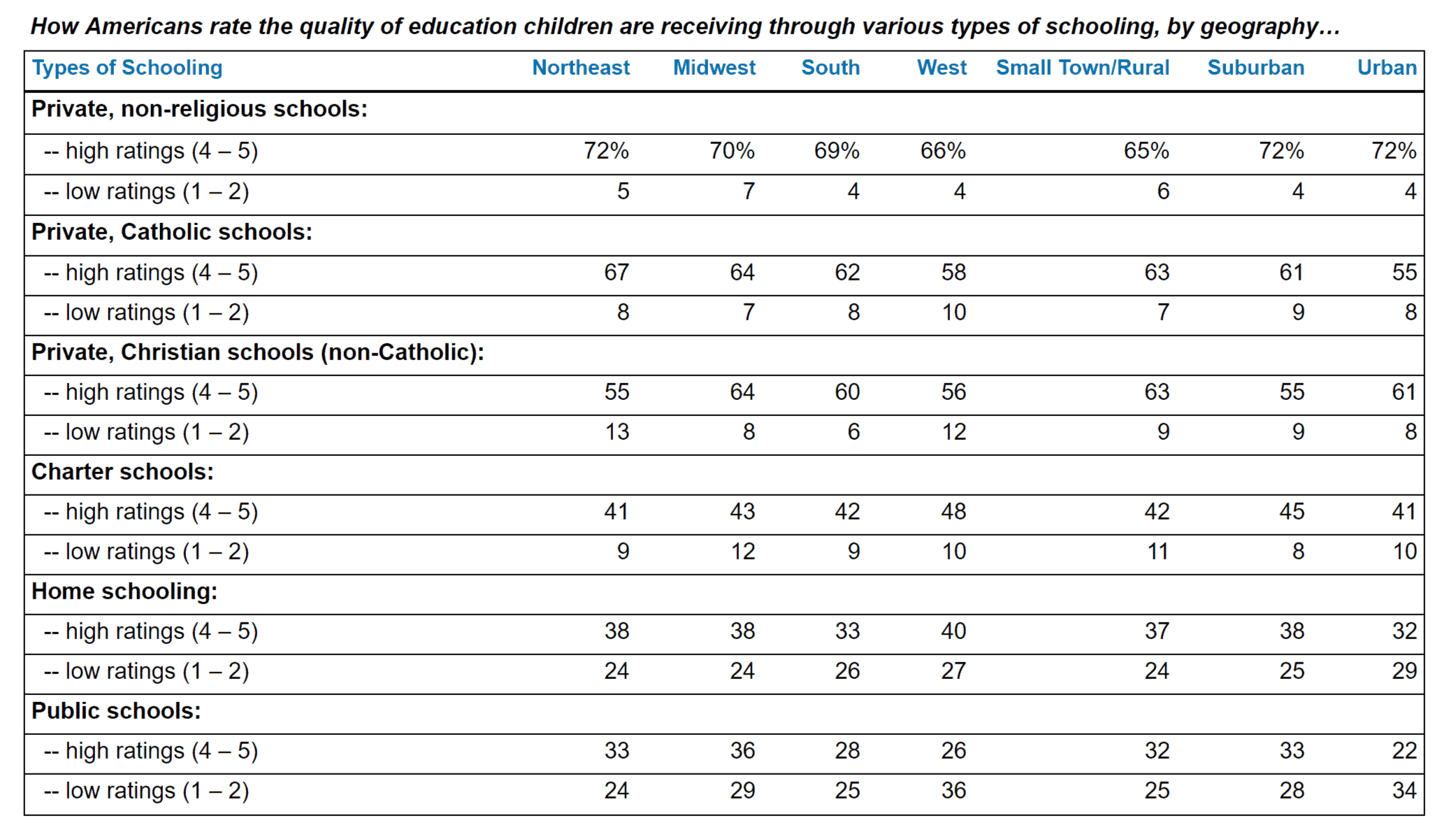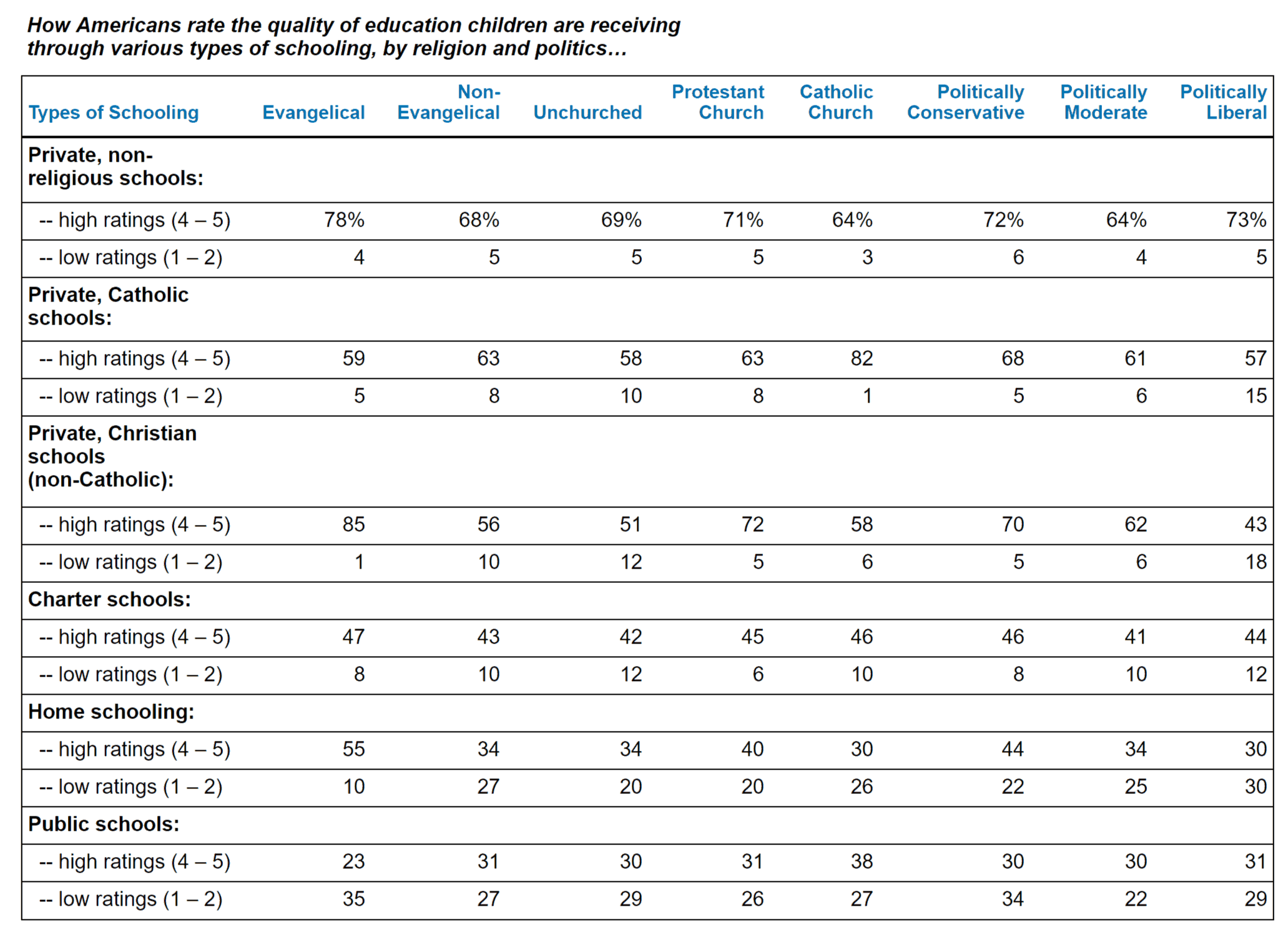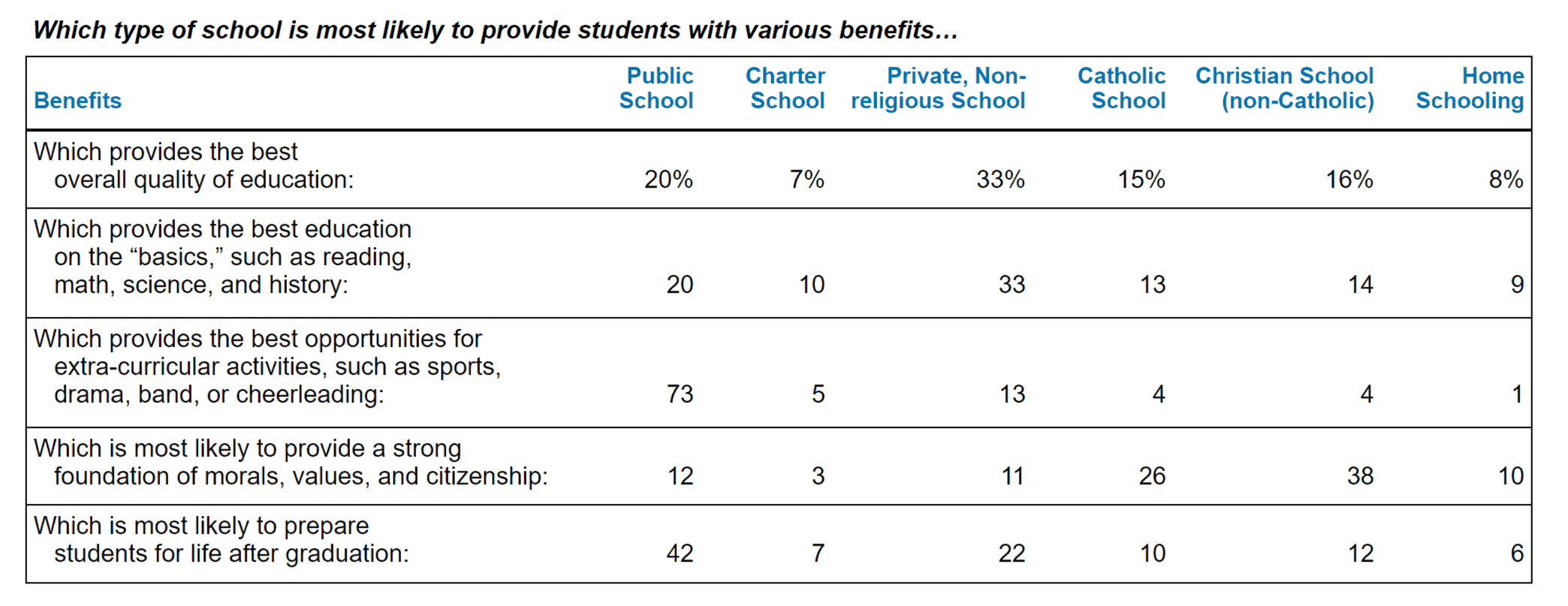Most Americans believe public schools are not the best option for a good education
(Original release date: April 14, 2008) Study results released from Grey Matter Research & Consulting (formerly Ellison Research) of Phoenix, Arizona show the vast majority of Americans have significant doubts about the quality of a public school education, and believe other options generally are better for children.
The findings are from a study independently designed, funded, and conducted by Grey Matter Research among a representative sample of over 1,000 American adults. Grey Matter Research is a full-service marketing research firm.
The study asked Americans to rate the overall quality of education students get from public schools, home schooling, charter schools, and three types of private schools: non-religious, Catholic, and Christian (non-Catholic), and then to decide which option is the best for students in a number of different ways.
Just 6% of all Americans rate the quality of education students receive through public schools as excellent. On a five-point scale (1 = poor and 5 = excellent), the average rating a public school education gets is just 3.0. In fact, Americans are about as likely to have a negative impression of public school education (28%) as they are to have a positive impression (31%).
With some recent court cases in California, home schooling has been in the news recently. Americans see home schooling in a slightly more positive light than they do public schools. The average rating for home schooling quality of education is 3.14, with 11% calling it excellent, 37% overall having a positive impression of it, and 25% having a negative impression of it. (Note: the data for this study was gathered well before the California court cases that hit the news shortly after the study was conducted, so news reports on that topic had no impact on the findings.)
Next in line are charter schools. The average rating is 3.41, with 10% calling the quality of education excellent. Overall, 43% have positive impressions of the education at charter schools, with only 10% having a negative impression.
Private Christian (non-Catholic) schools are rated overall at 3.69, with 22% saying the education is excellent, six out of ten giving these schools a positive rating, and just 9% rating them negatively. Very similar are the ratings for private Catholic schools (average of 3.74, 22% excellent, 62% positive overall, and 8% negative).
At the top of the ratings are private non-religious schools, with an average rating of 3.86. Twenty-three percent call these schools excellent, and 69% are positive toward the quality of education in them overall. Just 5% feel negatively toward the quality of education at private non-religious schools.
Ratings of different educational options vary more by religious and political perspectives than by demographics such as age, education, or gender. In fact, throughout this study, there are very few differences in perception between people who currently have children under the age of 18 in their household, and those who don’t.
Political liberals, moderates, and conservatives all feel about the same regarding charter schools, private non-religious schools, and public schools. However, on home schooling, conservatives are twice as likely to be positive as negative (44% to 22%), moderates are somewhat more likely to be positive than negative (34% to 25%), and liberals are divided (30% positive, 30% negative). Liberals are also more likely than others to be negative toward the quality of a Catholic school education (15%, compared to 6% of moderates and 5% of conservatives).
But the biggest difference is in how people of different political perspectives rate the quality of education at private Christian schools. Among conservatives, 70% have a positive view of the quality, while only 5% have a negative view. Moderates are similar – 62% positive, 6% negative. Liberals are more likely to be positive than negative, but the gap is much smaller: 43% positive, 18% negative.
Overall, conservatives rate all three private school options about equally high on the scale, followed by home schooling and charter schools, with public schools distantly last. Liberals clearly put private non-religious schools at the top of the heap, followed by Catholic schools, then charter and private Christian (non-Catholic) equally rated, with home schooling and public schools equally tied at the very bottom.
Religiously, it’s no surprise that each group thinks very highly of “its own” type of education. Among practicing Catholics, 82% rate the quality of a Catholic school education highly, with only 1% saying the quality is not good. But 58% of Catholics still think highly of the quality of education from non-Catholic Christian schools.
Among people who attend a Protestant church, 72% give a positive rating to the education at Christian (non-Catholic) schools, but this rating is equal to the rating for private non-religious schools, and just a little above that given to Catholic schools (63%).
Evangelicals (a subset of Protestants) are the religious group most likely to give a high rating to the quality of education at Christian (non-Catholic) schools (85%), although they also rate private non-religious schools (78%) and Catholic schools (58%) highly. Evangelicals are also particularly likely to give a high quality rating to home schooling (55%), and their ratings of public school education are among the lowest in the study (only 23% positive, with 35% negative).
Even among people who do not attend religious worship services at all, religious schools are rated highly for quality of education. Among the unchurched, the most likely to get a positive rating are private non-religious schools (69%), followed by Catholic and Christian (non-Catholic) schools (58% and 51%, respectively). Religious schools are much more likely to be seen by the unchurched as providing a good education than are charter schools (42%), home schooling (34%), or public schools (30%).
Study respondents also selected which one of these six types of schooling is the most likely to benefit children in a number of different areas. In terms of which type of schooling provides the best overall quality of education, the winner is private non-religious schools (33%), followed by public schools (20%), Christian (16%), Catholic (15%), and home schooling (8%).
The ratings are very similar when people are asked which one provides the best education in the basics, such as math, science, reading, and history: private non-religious (33%), public (20%), Christian (14%), Catholic (13%), charter (10%) and home schooling (9%).
Where the religious schools really shine, according to Americans, is in providing a strong foundation of morals, values, and citizenship. Thirty-eight percent said the best option for this is Christian (non-Catholic) schools (38%), followed by Catholic (26%), public (12%), private non-religious (11%), home schooling (10%), and charter schools (3%).
Where public schools have a decided advantage is in extracurricular activities, such as cheerleading, sports, band, and drama. Seventy-three percent of Americans say public schools provide the best opportunities in this area, with only private non-religious schools also reaching double digits (11%).
Although only two out of ten Americans believe public schools offer the best quality of education, twice as many (42%) believe public schools are the most likely to prepare students for life after graduation. Second are private non-religious schools (22%), followed by Christian (12%), Catholic (10%), charter (7%), and home schooling (6%).
Ron Sellers, president of Grey Matter Research, noted that the study helped explode a few myths about home schooling. “Although we weren’t particularly focusing on home schooling, this research did show just how far home schooling has come in the public eye, as well as how far it still has to go,” Sellers stated. “On the negative side for home schooling, this option was consistently at or near the bottom when compared against other educational options. But on the positive side, more Americans believe it’s giving children a good education than a poor one. In addition, home schooling actually has a slightly better reputation than public schools. And even though home schooling is often stereotyped as primarily a choice of religious conservatives, the unchurched gave the quality of a home school education a higher rating than a public school education, and political liberals rated the two about equally.”
Sellers also noted that religious schools are generally held in high regard even among people who are not particularly religious, or from a different religious background. “Protestants in general, and evangelicals specifically, give Catholic schools high ratings. Catholics largely view Christian (non-Catholic) schools in a very positive light. And even people who aren’t involved in a church of any type rate the quality of education at religious schools very highly.”
He also noted that the study’s findings may be disconcerting to many educators. “Undoubtedly, different types of educators generally feel their way of doing things is the best, and many will be less than thrilled to learn that Americans don’t necessarily share their feelings. However, it’s critical that they think about why this is, rather than just being unhappy with these perceptions. For example, charter school educators need to consider why their own rankings don’t come remotely close to those of private non-religious schools, even though they share some similarities. Home schoolers should think about why home schooling still isn’t accepted by many people. Public school educators need to think about why eight out of ten Americans think other options provide a better education for the nation’s children. Religious educators need to consider why Americans often think public schools do a better job preparing kids for life after graduation, even though they think the quality of education, and the ability to teach morals, values, and citizenship, are both much lower in public schools than in religious schools. Hopefully, this study will give educators of all types – as well as parents making decisions about their children’s education – plenty to think about.”
Study Details:
The study was conducted by Grey Matter Research & Consulting (formerly Ellison Research), a marketing research company located in Phoenix, Arizona. The sample of 1,007 adults is accurate to within ±3.1 percentage points at the 95 percent confidence level with a 50 percent response distribution.
The study was conducted in all 50 states. Respondents’ age, household income, geography, racial or ethnic background, and gender were carefully tracked to ensure appropriate representation and accuracy.




